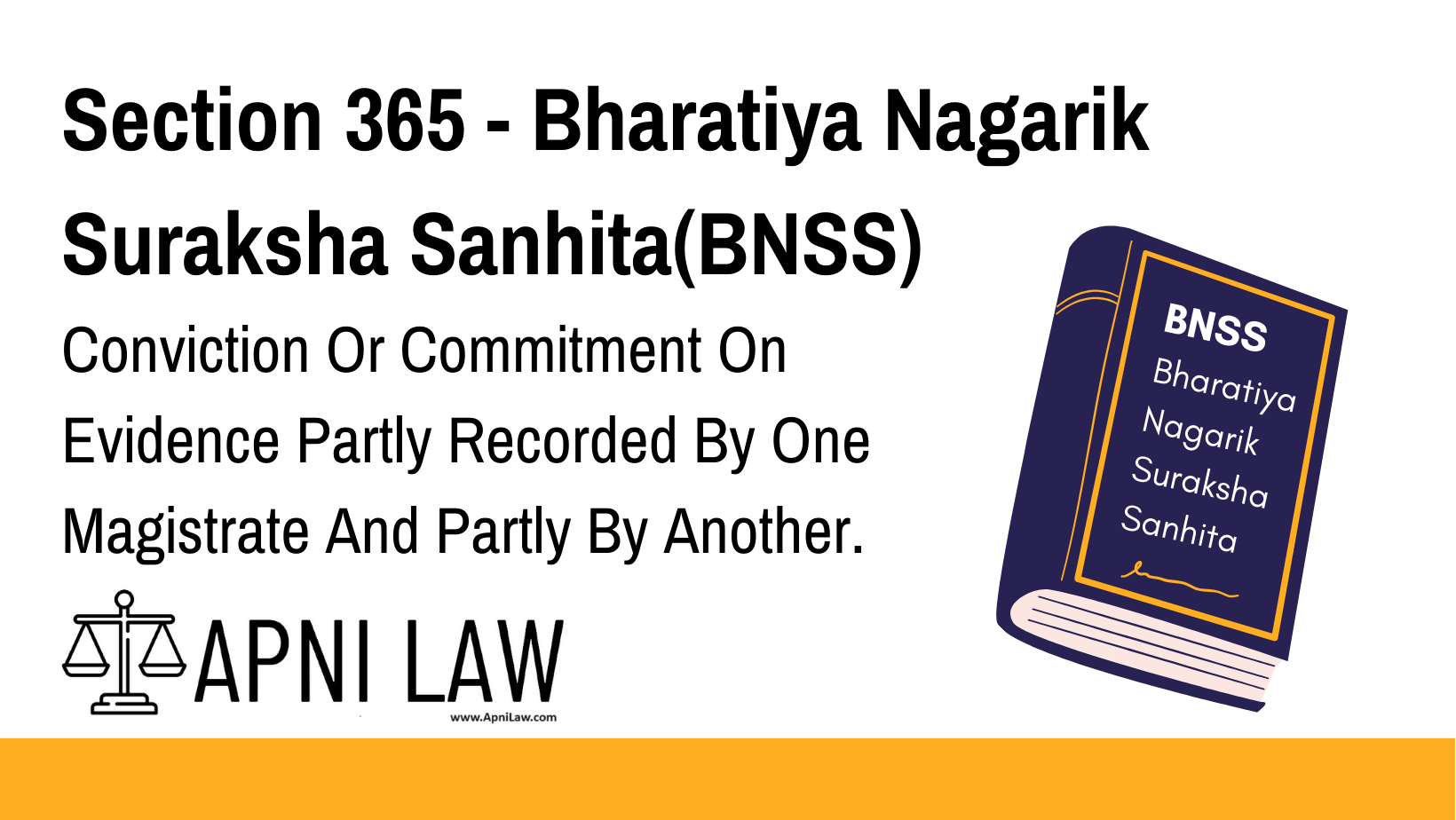Bharatiya Nagarik Suraksha Sanhita (BNSS) – Section 365
Code: Section 365 BNSS
(1) Whenever any Judge or Magistrate, after having heard and recorded the whole or any part of the evidence in any inquiry or a trial, ceases to exercise jurisdiction therein and is succeeded by another Judge or Magistrate who has and who exercises such jurisdiction, the Judge or Magistrate so succeeding may act on the evidence so recorded by his predecessor, or partly recorded by his predecessor and partly recorded by himself:
Provided that if the succeeding Judge or Magistrate is of the opinion that further examination of any of the witnesses whose evidence has already been recorded is necessary in the interests of justice, he may re-summon any such witness, and after such further examination, cross-examination, and re-examination, if any, as he may permit, the witness shall be discharged.
(2) When a case is transferred under the provisions of this Sanhita from one Judge to another Judge or from one Magistrate to another Magistrate, the former shall be deemed to cease to exercise jurisdiction therein and to be succeeded by the latter, within the meaning of sub-section (1).
(3) Nothing in this section applies to summary trials or to cases in which proceedings have been stayed under Section 361 or in which proceedings have been submitted to a superior Magistrate under Section 364.
Explanation of Section 365 BNSS
This section addresses the continuity of trial proceedings when a Judge or Magistrate handling a case ceases to exercise jurisdiction (due to transfer, retirement, promotion, etc.). The new Judge or Magistrate can use the evidence recorded by their predecessor to avoid delays in justice.
Key Provisions
- Use of Predecessor’s Evidence
- The succeeding Judge or Magistrate can rely on evidence already recorded.
- This avoids restarting the trial, saving time and resources.
- Right to Re-Summon Witnesses
- If the new Judge feels it is necessary for justice, they may recall witnesses for further examination.
- Applicability in Case Transfers
- When a case is formally transferred, the new Judge is considered to have succeeded the previous one under this section.
- Exceptions
- Does not apply to summary trials.
- Does not apply if proceedings have been stayed under Section 361.
- Does not apply if the case has been submitted to a superior Magistrate under Section 364.
Illustration
Example 1: Judge Replacement in a Criminal Trial
A Judge in a murder trial has recorded 50% of the witness statements but is transferred. The new Judge can continue the trial using the recorded evidence without starting over but may recall witnesses if needed.
Example 2: Case Transfer to a Different Court
A theft case is transferred from one Magistrate to another due to a jurisdictional issue. The new Magistrate can rely on previously recorded evidence and continue the trial.
Example 3: Exception for Summary Trials
A petty theft case being conducted under summary trial procedure cannot follow this section. The new Magistrate must restart the trial.
Common Questions and Answers on Section 365 BNSS
1. What happens if a Judge is transferred in the middle of a trial?
The new Judge can rely on previously recorded evidence to continue the trial instead of starting over.
2. Can the new Judge re-examine witnesses?
Yes, if the Judge feels it is necessary for fairness and justice, they can recall witnesses for further questioning.
3. Does this rule apply to summary trials?
No, summary trials require a fresh trial under the new Magistrate.
4. What happens if proceedings are stayed under Section 361 BNSS?
If the case has been stayed, this section does not apply, and the case must follow the appropriate legal procedure.
5. Can the accused challenge the use of prior evidence?
The accused has the right to request re-examination of witnesses if they believe it is essential for a fair trial.
Conclusion
Section 365 BNSS ensures continuity in criminal trials by allowing new Judges or Magistrates to use previously recorded evidence. This helps prevent delays and ensures justice is not denied due to administrative changes. However, the accused’s right to fair trial is protected, as the Judge can recall witnesses if needed.
For expert legal insights, visit ApniLaw today! 🚀








